
Jane Austen was an English novelist known primarily for her six novels, which implicitly interpret, critique, and comment upon the British landed gentry at the end of the 18th century. Austen's plots often explore the dependence of women on marriage for the pursuit of favourable social standing and economic security. Her works are implicit critiques of the novels of sensibility of the second half of the 18th century and are part of the transition to 19th-century literary realism. Her use of social commentary, realism, and irony have earned her acclaim amongst critics and scholars.
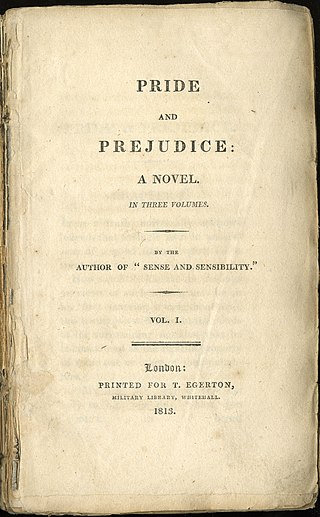
Pride and Prejudice is the second novel by English author Jane Austen, published in 1813. A novel of manners, it follows the character development of Elizabeth Bennet, the protagonist of the book, who learns about the repercussions of hasty judgments and comes to appreciate the difference between superficial goodness and actual goodness.

Northanger Abbey is a coming-of-age novel and a satire of Gothic novels written by the English author Jane Austen. Although the title page is dated 1818 and was published posthumously in 1817 with Persuasion, Northanger Abbey was completed in 1803, making it the first of Austen's novels to be completed in full. From a fondness of Gothic novels and an active imagination distorting her worldview, the story follows Catherine Morland, the naïve young protagonist, as she develops to better understand herself and the world around her.

Emma is a novel written by English author Jane Austen. It is set in the fictional country village of Highbury and the surrounding estates of Hartfield, Randalls and Donwell Abbey, and involves the relationships among people from a small number of families. The novel was first published in December 1815, although the title page is dated 1816. As in her other novels, Austen explores the concerns and difficulties of genteel women living in Georgian–Regency England. Emma is a comedy of manners.
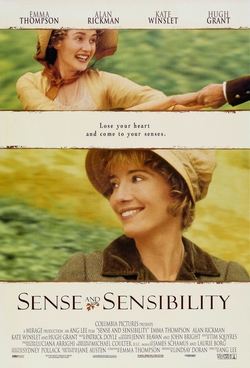
Sense and Sensibility is a 1995 period drama film directed by Ang Lee and based on Jane Austen's 1811 novel. Emma Thompson wrote the screenplay and stars as Elinor Dashwood, while Kate Winslet plays Elinor's younger sister Marianne. The story follows the Dashwood sisters, members of a wealthy English family of landed gentry, as they must deal with circumstances of sudden destitution. They are forced to seek financial security through marriage. Hugh Grant and Alan Rickman play their respective suitors.

Judith Martin, better known by the pen name Miss Manners, is an American columnist, author, and etiquette authority.

Eve Kosofsky Sedgwick was an American academic scholar in the fields of gender studies, queer theory, and critical theory. Sedgwick published several books considered groundbreaking in the field of queer theory, and her critical writings helped create the field of queer studies, in which she was one of the most influential figures. Sedgwick's essays became the framework for critics of poststructuralism, multiculturalism, and gay studies.
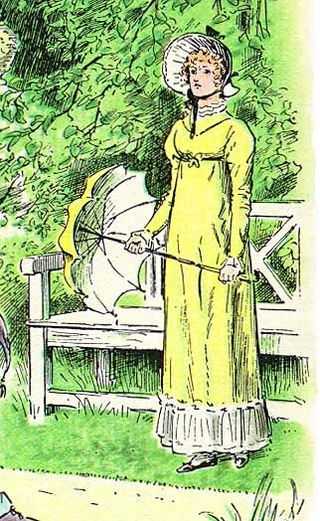
Elizabeth Bennet is the protagonist in the 1813 novel Pride and Prejudice by Jane Austen. She is often referred to as Eliza or Lizzy by her friends and family. Elizabeth is the second child in a family of five daughters. Though the circumstances of the time and environment push her to seek a marriage of convenience for economic security, Elizabeth wishes to marry for love.

Sensibility refers to an acute perception of or responsiveness toward something, such as the emotions of another. This concept emerged in eighteenth-century Britain, and was closely associated with studies of sense perception as the means through which knowledge is gathered. It also became associated with sentimental moral philosophy.
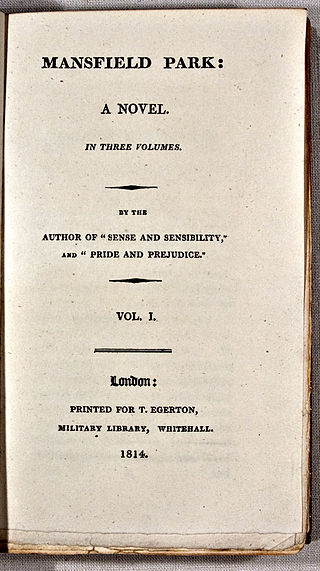
Mansfield Park is the third published novel by the English author Jane Austen, first published in 1814 by Thomas Egerton. A second edition was published in 1816 by John Murray, still within Austen's lifetime. The novel did not receive any public reviews until 1821.
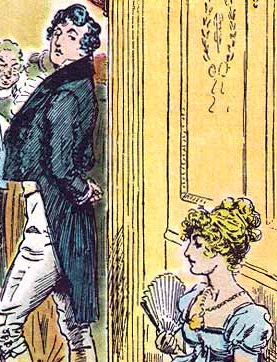
Fitzwilliam Darcy Esquire, generally referred to as Mr. Darcy, is one of the two central characters in Jane Austen's 1813 novel Pride and Prejudice. He is an archetype of the aloof romantic hero, and a romantic interest of Elizabeth Bennet, the novel's protagonist. The story's narration is almost exclusively from Elizabeth's perspective; the reader is given a one-sided view of Darcy for much of the novel, but hints are given throughout that there is much more to his character than meets the eye. The reader gets a healthy dose of dramatic irony as Elizabeth continually censures Mr. Darcy's character despite the aforementioned hints that Mr. Darcy is really a noble character at heart, albeit somewhat prideful. Usually referred to only as "Mr. Darcy" or "Darcy" by characters and the narrator, his first name is mentioned twice in the novel.

Elinor Dashwood is a fictional character and the protagonist of Jane Austen's 1811 novel Sense and Sensibility.
Janet Margaret Todd is a British academic and author. She was educated at Cambridge University and the University of Florida, where she undertook a doctorate on the poet John Clare. Much of her work concerns Mary Wollstonecraft, Jane Austen, and their circles.
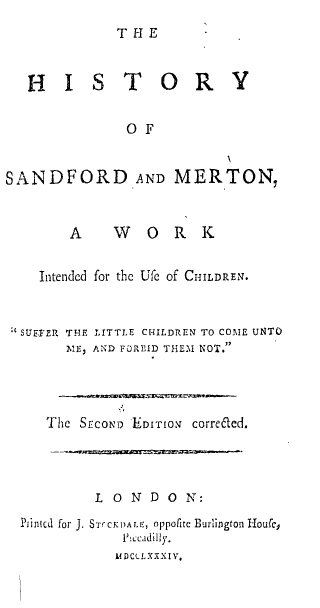
The History of Sandford and Merton (1783–89) was a best-selling children's book written by Thomas Day. He began it as a contribution to Richard Lovell and Honora Sneyd Edgeworth's Harry and Lucy, a collection of short stories for children that Maria Edgeworth continued some years after her stepmother died. He eventually expanded his original short story into the first volume of The History of Sandford and Merton, which was published anonymously in 1783; two further volumes subsequently followed in 1786 and 1789. The book was wildly successful and was reprinted until the end of the nineteenth century. It retained enough popularity or invoked enough nostalgia at the end of the nineteenth century to inspire a satire, The New History of Sandford and Merton, whose preface proudly announces that it will "teach you what to don't".

The reception history of Jane Austen follows a path from modest fame to wild popularity. Jane Austen (1775–1817), the author of such works as Pride and Prejudice (1813) and Emma (1815), has become one of the best-known and most widely read novelists in the English language. Her novels are the subject of intense scholarly study and the centre of a diverse fan culture.
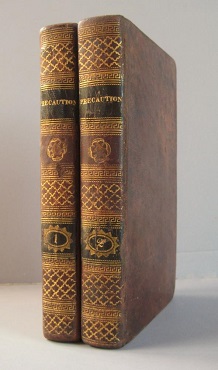
Precaution (1820) is the first novel by American author James Fenimore Cooper.

Jane Austen lived her entire life as part of a family located socially and economically on the lower fringes of the English gentry. The Rev. George Austen and Cassandra Leigh, Jane Austen's parents, lived in Steventon, Hampshire, where Rev. Austen was the rector of the Anglican parish from 1765 until 1801. Jane Austen's immediate family was large and close-knit. She had six brothers—James, George, Charles, Francis, Henry, and Edward—and a beloved older sister, Cassandra. Austen's brother Edward was adopted by Thomas and Elizabeth Knight and eventually inherited their estates at Godmersham, Kent, and Chawton, Hampshire. In 1801, Rev. Austen retired from the ministry and moved his family to Bath, Somerset. He died in 1805 and for the next four years, Jane, Cassandra, and their mother lived first in rented quarters and then in Southampton where they shared a house with Frank Austen's family. During these unsettled years, they spent much time visiting various branches of the family. In 1809, Jane, Cassandra, and their mother moved permanently into a large "cottage" in Chawton village that was part of Edward's nearby estate. Austen lived at Chawton until she moved to Winchester for medical treatment shortly before her death in 1817.

The term Janeite has been both embraced by devotees of the works of Jane Austen and used as a term of opprobrium. According to Austen scholar Claudia Johnson Janeitism is "the self-consciously idolatrous enthusiasm for 'Jane' and every detail relative to her".
Jane Austen's (1775–1817) distinctive literary style relies on a combination of parody, burlesque, irony, free indirect speech and a degree of realism. She uses parody and burlesque for comic effect and to critique the portrayal of women in 18th-century sentimental and Gothic novels. Austen extends her critique by highlighting social hypocrisy through irony; she often creates an ironic tone through free indirect speech in which the thoughts and words of the characters mix with the voice of the narrator. The degree to which critics believe Austen's characters have psychological depth informs their views regarding her realism. While some scholars argue that Austen falls into a tradition of realism because of her finely executed portrayal of individual characters and her emphasis on "the everyday", others contend that her characters lack a depth of feeling compared with earlier works, and that this, combined with Austen's polemical tone, places her outside the realist tradition.
Rachel M. Brownstein is an American feminist literary critic, author, and academic.















